

The Rocky Mountain Institute has published a new whitepaper that looks at the penetration of electric vehicles in these three markets and has evaluated the role of policy, economics, infrastructure, and behavioral norms in shaping the mobility transformations in these three countries.
Following are the insights and recommendations for accelerating EV adoption across the three countries:
It highlights that China and India have the potential to leapfrog the American paradigm of car ownership due to their rapid urbanization and less entrenched car culture. The report also dwells on autonomous vehicle technology and adds that China’s funding and research into AV technology will likely accelerate the pace of AV development globally.
The report talks about how China, India, and the United States are at different stages of development in these emerging technologies and they have the opportunity to share learnings and adapt each other’s frameworks to accelerate the global mobility transition.
It further adds that since both India and China are the two fastest-developing economies in the world, they aspire to become global leaders in vehicle manufacturing and intelligent mobility technologies. These countries are playing roles in shaping global mobility future to ensuring that the world gets the best mobility future possible, the report said.
To read more about the report, click here
1. The mandate for blending Compressed Biogas (CBG) with natural gas has come into effect…
Andhra Pradesh is striving towards greening its energy sector with quite some speed. In a…
With an objective to bolster India’s green energy goals, a Tripartite Agreement has been signed…
The Union MNRE Minister Pralhad Joshi launched the Green Hydrogen Certification Scheme of India (GHCI)…
India’s energy conglomerate Bharat Petroleum Corporation Limited (BPCL) has commissioned a 5MW green hydrogen plant…
In a historical development, the European Space Agency (ESA) has successfully launched its pioneering ‘Biomass’…